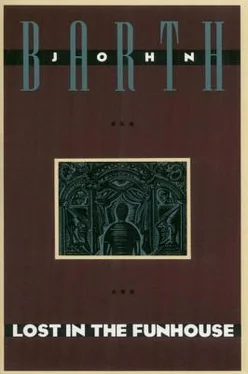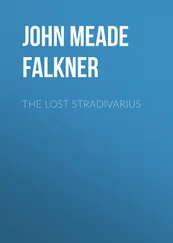John Barth - Lost in the Funhouse
Здесь есть возможность читать онлайн «John Barth - Lost in the Funhouse» весь текст электронной книги совершенно бесплатно (целиком полную версию без сокращений). В некоторых случаях можно слушать аудио, скачать через торрент в формате fb2 и присутствует краткое содержание. Год выпуска: 2014, ISBN: 2014, Издательство: Knopf Doubleday Publishing Group, Жанр: Современная проза, на английском языке. Описание произведения, (предисловие) а так же отзывы посетителей доступны на портале библиотеки ЛибКат.
- Название:Lost in the Funhouse
- Автор:
- Издательство:Knopf Doubleday Publishing Group
- Жанр:
- Год:2014
- ISBN:978-0-8041-5250-1
- Рейтинг книги:3 / 5. Голосов: 1
-
Избранное:Добавить в избранное
- Отзывы:
-
Ваша оценка:
- 60
- 1
- 2
- 3
- 4
- 5
Lost in the Funhouse: краткое содержание, описание и аннотация
Предлагаем к чтению аннотацию, описание, краткое содержание или предисловие (зависит от того, что написал сам автор книги «Lost in the Funhouse»). Если вы не нашли необходимую информацию о книге — напишите в комментариях, мы постараемся отыскать её.
Lost in the Funhouse — читать онлайн бесплатно полную книгу (весь текст) целиком
Ниже представлен текст книги, разбитый по страницам. Система сохранения места последней прочитанной страницы, позволяет с удобством читать онлайн бесплатно книгу «Lost in the Funhouse», без необходимости каждый раз заново искать на чём Вы остановились. Поставьте закладку, и сможете в любой момент перейти на страницу, на которой закончили чтение.
Интервал:
Закладка:
Stranded by my foes,
Nowadays I write in prose,
Forsaking measure, rhyme, and honeyed diction;
Amphora’s my muse:
When I finish off the booze,
I hump the jug and fill her up with fiction.
I begin in the middle — where too I’ll end, there being alas to my arrested history as yet no dénouement. God knows how long I’d been out of writing material until this morning, not to mention how long altogether I’ve been marooned upon this Zeus-forsaken rock, in the middle of nowhere. There, I’ve begun, in the middle of nowhere, tricked ashore in manhood’s forenoon with nine amphorae of Mycenaean red and abandoned to my own devisings. After half a dozen years of which more later I was down to the last of them, having put her sisters to the triple use aforesung: one by one I broke their seals, drank the lovelies dry, and, fired by their beneficence, not only made each the temporary mistress of my sole passion but gave back in the form of art what I’d had from them. Me they nourished and inspired; them I fulfilled to the top of my bent, and launched them worldward fraught with our joint conceits. Their names are to me now like the memory of old songs: Euterpe! Polyhymnia! I recall Terpsichore’s lovely neck, Urania’s matchless shoulders; in dreams I hear Melpomene singing yet in the wet west wind, her voice ever deeper as our romance waned; I touch again Erato’s ears, too delicate for mortal clay, surely the work of Aphrodite! I smile at Clio’s gravity, who could hold more wine than any of her sisters without growing tipsy; I shake my head still at the unexpected passion of saucy Thalia, how she clung to me even when broken by love’s hard knocks. Fair creatures. Often I wonder where the tides of life have fetched them, whether they’re undone by age and the world or put on the shelf by some heartless new master. What lovers slake themselves now at those fragile mouths? Do they still bear my charge in them, or is it jettisoned and lost, or brought to light?
With anticipation of Calliope, the last, I consoled me for their casting off. Painful state for a lover, to have always before him the object of his yen — naked, cool, serene — and deny his parchèd sense any slake but the lovely sight of her! No less a regimen I imposed upon myself — imperfectly, imperfectly, I’m not made of stone, and there she stood, brimful of spirit, heavy with what I craved, sweating delicately where the sun caressed her flank, and like her sisters infinitely accessible! A night came, I confess it, when need overmastered me; I broke my vow and her seal; other nights followed (never many in a season, but blessed Zeus, most blest Apollo, how many empty seasons have gone by!) when, despite all new resolve and cursing my weak-willedness even as I tipped her to my will, I eased my burden with small increase of hers. But take her to me altogether I did not, or possess myself of the bounty I thirsted for, and which freely she would yield. Until last night! Until the present morn! For in that measureless drear interval, now to be exposed, I had nothing to write upon, no material wherewith to fashion the work I’d vowed she must inspire me to, and with which, in the last act of our loveship and my life, I’d freight her.
Calliope, come, refresh me; it’s the hour for exposition!
I’ll bare at last my nameless tale, and then …
Hie here, sweet Muse: your poet must dip his pen!
1
Ink of the squid, his obscure cloak; blood of my heart; wine of my inspiration: record on Helen’s hide, in these my symbols, the ills her namesake wrought what time, forsaking the couch of fairhaired Menelaus, she spread her legs for Paris et cetera.
My trouble was, back home in ’prentice days, I never could come out straight-faced with “Daughter of Zeus, egg-born Clytemnestra” and the rest, or in general take seriously enough the pretensions of reality. Youngster though I was, nowise sophisticated, I couldn’t manage the correct long face when Agamemnon hectored us on Debts of Honor, Responsibility to Our Allies, and the like. But I don’t fool myself: if I never took seriously the world and its tiresome concerns, it’s because I was never able to take myself seriously; and the reason for that, I’ve known for some while, is the fearsomeness of the facts of life. Merope’s love, Helen’s whoring, Menelaus’s noise, Agamemnon’s slicing up his daughter for the weatherman — all the large and deadly passions of men and women, wolves, frogs, nightingales; all this business of seizing life, grabbing hold with both hands — it must’ve scared the daylights out of me from the first. While other fellows played with their spears, I learned to play the lyre. I wasn’t the worst-looking man in Argolis; I had a ready wit and a good ear, and knew how to amuse the ladies. A little more of those virtues (and a lot more nerve, and better luck in the noble-birth way), I might have been another Paris; it’s not your swaggerers like Menelaus the pretty girls fall for, or even your bully-boys like Agamemnon: it’s the tricky chaps like Paris, graceful as women themselves almost, with their mischief eyes and honey tongues and nimble fingers, that set maiden hearts a-flutter and spit maidenheads like squablings. Aphrodite takes care of her own. Let that one have his Helen; this musicked to him in his eighteenth year milkmaid Merope, fairest-formed and straightest-hearted that ever mused goatherd into minstrelsy.
Daily then I pastured with that audience, two-score nans and my doe-eye nymph, to whom I sang songs perforce original, as I was ignorant of the common store. Innocent, I sang of innocence, thinking I sang of love and fame. Merope put down her jug, swept back her hair, smiled and listened. In modes of my own invention, as I supposed, I sang my vow to make a name for myself in the world at large.
“Many must wish the same,” my honeyhead would murmur. But could she’ve shown me that every browsy hill in Greece had its dappled nans and famestruck twanger, I’d’ve not been daunted. My dreams, like my darling, perched light but square on a three-leg seat: first, while I scoffed at them myself, and at the rube their dreamer, I sucked them for life; the world was wide, as my songs attested, its cities flocked with brilliant; I was a nameless rustic plucker, unschooled, unmannered, late finding voice, innocent of fashion, uneasy in the world and my own skin — so much so, my crazy hope of shedding it was all sustained me. Fair as the country was and the goatboy life my fellows’ lot, if I could not’ve imagined my music’s one day whisking me Orionlike to the stars, I’d have as well flung myself into the sea. No other fate would even faintly do; an impassioned lack of alternatives moved my tongue; what for another might be heartfelt wish was for me an absolute condition. Second, untutored as I was and narrow my acquaintance, I knew none whose fancy so afflicted him as mine me. Especially when I goated it alone, the world’s things took a queer sly aspect: it was as if the olive hillside hummed, not with bees, but with some rustle secret; the placid goats were in on it; asphodels winked and nodded behind my back; the mountain took broody note; the very sunlight trembled; I was a stranger to my hands and feet. Merope herself, when these humors gripped me, was alien and horrific as a sphinx: her perfect body, its pulse and breath, smote me with dismay: ears! toes! What creature did it wrap, that was not I, that claimed to love me? My own corse was a rude anthropophage that had swallowed me whole at birth and suffered indigestion ever since; could Merope see what I couldn’t, who it was spoke from his gripèd bowles? When she and I, the goats our original, invented love — romped friggly in the glens and found half a hundred pretty pathways to delight, each which we thought ourselves the first to tread — some I as foreign to the me that pleasured as goatherd to goats stood by, tight-lipped, watching, or aswoon at the entire strangeness of the world.
Читать дальшеИнтервал:
Закладка:
Похожие книги на «Lost in the Funhouse»
Представляем Вашему вниманию похожие книги на «Lost in the Funhouse» списком для выбора. Мы отобрали схожую по названию и смыслу литературу в надежде предоставить читателям больше вариантов отыскать новые, интересные, ещё непрочитанные произведения.
Обсуждение, отзывы о книге «Lost in the Funhouse» и просто собственные мнения читателей. Оставьте ваши комментарии, напишите, что Вы думаете о произведении, его смысле или главных героях. Укажите что конкретно понравилось, а что нет, и почему Вы так считаете.












